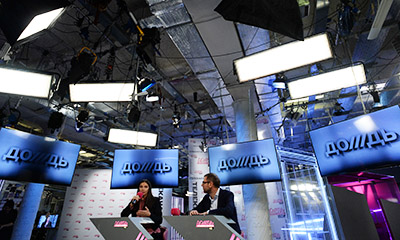Late last month, as thousands of international journalists prepared to descend on Sochi to cover the Winter Olympics, the Kremlin resorted to using a controversy to silence a critical television station. A direct move to shut down the station would have been too blunt–particularly at a time when all eyes were on Russia–so authorities resorted to exploiting a producer’s blunder, blowing it out of proportion, and pushing a third party to do their bidding. This is what happened.
On January 26, the independent television channel Dozhd (Rain) ran a poll on its website pegged to the 70-year anniversary of the end of the 900-day-siege of Leningrad (now St. Petersburg) by Nazi Germany during World War II. The poll asked whether the Soviet Union should have surrendered the city to save the hundreds of thousands of lives that were lost in the siege, mostly because of starvation. The question could not be more sensitive in a country that holds the Great Patriotic War in reverence and where even a hint of criticism of its handling could be considered a dishonor to the memory of the dead.
The station quickly pulled the poll off its website and apologized, but it was too late. The poll had caused a stir, followed by much criticism by various public officials, including the presidential spokesman, Dmitry Peskov. State Duma deputies with the ruling United Russia party publicly called for the station’s ban. Peskov, in a January 29 interview with Dozhd itself, said the station had “crossed a moral-ethical red line” in posing the siege question. The “channel had crossed all permissible boundaries,” he said, and called on the audience not to tolerate the incident. “Because the moment we start having even the slightest tolerance to such polls, we will start eroding as a nation, eroding our memory, the genetic memory of our people,” he said.
Peskov’s interview–given, in his words, as a viewer rather than the president’s spokesman–was accompanied by other angry reactions. That same day, members of the St. Petersburg Legislative Assembly approved an appeal to Russian Prosecutor-General Yuri Chaika, calling on him to investigate whether Dozhd had broken the law by posting such “provocative material,” and to take all necessary measures up to closing the channel, the Russian website Newsru reported. Chaika’s office confirmed that the appeal would be promptly considered, the local press said.
Then, days after Dozhd ran the controversial poll, Yuri Pripachkin, head of the Cable Television Association of Russia, which includes both private and state-owned telecommunication operators in the country, called for pulling the plug on the channel. The channel’s cable and satellite providers began dropping the station from their service packages.
Dozhd started as an online television channel in 2010, and in the following three years gained cable and satellite operations. As of January 25, the channel reached a total of 17.7 million homes and 4 million users online, Mikhail Zygar, the station’s editor-in-chief, told CPJ. But today, only small regional providers are carrying the channel, he said. The channel’s scope has dropped from reaching close to 18 million Russian homes to reaching only about 2 million homes, Zygar told CPJ.
Pripachkin, a former Soviet army captain turned businessman, may have personally been insulted by the Dozhd poll, but the decision of a dozen major operators to pull the plug on Dozhd smacks of a political order beyond Pripachkin’s purview. When the presidential spokesman publicly calls for intolerance to Dozhd’s alleged misbehavior, and when he invokes such sensitivities as the people’s “genetic memory” of World War II, he gives a de facto order to the relevant parties to act against the channel. In addition, reports said, cable providers had received daily phone calls from top Kremlin officials in the immediate aftermath of the Dozhd poll, pressing providers to withdraw services from the station.
According to Natalya Sindeyeva, Dozhd’s co-owner and general director, the poll was a pretext to destroy the station. Sindeyeva said on the air on January 29 that she believed the campaign to bring Dozhd to its knees was planned ahead of the poll and that it was in retaliation for the station’s critical reporting, including its coverage in November 2013 of an investigation by the popular anti-corruption blogger Aleksei Navalny about luxurious summer homes in the Moscow region, belonging to high-ranking government officials, whose cost many times exceeded the officials’ declared income.
In its three years of existence, Dozhd has provided an alternative to Kremlin-controlled federal television channels by giving a platform to opposition voices and focusing on news content. And its reach and impact have grown. As leading Russian media analyst Masha Lipman wrote on The New Yorker‘s blog in early February, “The channel’s reportage on politically sensitive issues–the Moscow street protests in 2011 and 2012; the mass unrest in Ukraine–has been dramatically different from the official coverage by Russia’s national television giants.”
“From the very start, our main audience has consisted of people who had stopped watching television,” Zygar told CPJ. “And this has been our motto: ‘Give television one more chance! Do not be afraid to turn on your television set!’ To an extent, we have succeeded in achieving that goal. We have often heard from viewers such comments as ‘I only bought a TV set because of your channel.'”
On Tuesday, Russia’s media regulator Roskomnadzor said in response to a query by Russia’s presidential human rights council, that cable and satellite operators had not violated the law or infringed on consumer rights when they dropped Dozhd from their packages, according to the English-language daily Moscow Times. Meanwhile, millions of Russians are being deprived of access to their preferred source of news and information.
